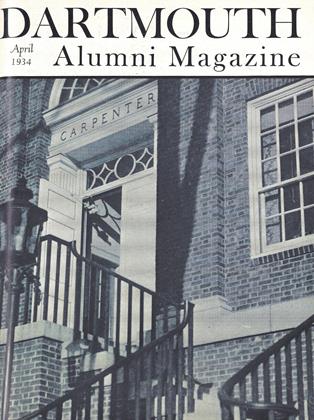These tragic events have combined with other established facts to exert a definite maturing effect, the extent of which we cannot determine, upon the undergraduate body as a whole. For one thing, the seniors not entering the professions or their fathers' employ, are realizing pretty clearly that any jobs they get are better than no jobs at all—and that they may not get them. From this uncomfortable observation, some of the boys are even beginning to wonder why this sad situation should be so. This nascent curiosity, leading in most cases to some sort of "radicalism" or other, has been further complicated by the honest-to-goodness war-clouds gathering all over the world. And when all this is topped with a clear, concise expose of munitionmakers and their relation to war in Fortune, the Bible of Tuck School, they are faced with a pretty kettle of fish indeed.
Awareness of such matters of common knowledge is of comparatively recent development; in fact, Steeplejack, most wideawake of the student publications, did not say much if anything about it until the end of February, when its editors brought forth analyses of war and its relations to capitalism, asking rather frankly for a Communist program of action. This particular issue, incidentally, sold over nine hundred copies.
The editors followed it up with more war material and an analysis of Fascism. This issue sold three hundred copies, which perhaps clarifies a little our introductory statement about Dartmouth individuality.
Nevertheless, the boys are manifesting considerably more interest in outside affairs than they were last April. The Junto is getting on its intellectual feet after long last and is conducting fairly well-attended weekly Sunday discussions on political issues in rooms formerly sacred to solecisms.
Nine Dartmouth men attended the Connecticut Valley Student Conference Against War at Northampton, and assented to a program of resolutions recognizing the economic bases of conflict and headed by the quiet statement that "We will support the government of the United States in no war it undertakes." As we go to press, a mass meeting will be held in Dartmouth Hall March 21 to vote on these resolutions. And for the first time in its history, the College sent a delegation to the New England Model League of Nations Conference.
At any rate, the boys are becoming aware of the threat of war in their young lives, whether it be intelligently, or in the manner of The Dartmouth which agrees with the "educators" and "journalists who realize that universal antipathy to war will not be realized until they stimulate a change in the collective human natures of all the races in the world." And in light of that brainstorm, perhaps distraught alumni have less to fear than they might from the radical influence of the Orozco frescoes.
 View Full Issue
View Full Issue
More From This Issue
-
 Class Notes
Class NotesClass of 1918
April 1934 By Allan C. Gottschaldt -
 Article
ArticleHANOVER BROWSING
April 1934 By Rees H. Bowen -
 Class Notes
Class NotesClass of 1910
April 1934 By Harold P. Hinman -
 Class Notes
Class NotesClass of 1908
April 1934 By Laurence W. Griswold -
 Class Notes
Class NotesClass of 1930
April 1934 By Albert I. Dickerson -
 Class Notes
Class NotesClass of 1923
April 1934 By John C. Allen
S. H. Silverman '34
-
 Article
ArticleTWENTY-FIVE JACK-O-LANTERNS
April 1933 By S. H. Silverman '34 -
 Article
ArticleTHE UNDERGRADUATE CHAIR
June 1933 By S. H. Silverman '34 -
 Article
ArticleCULTURE AT LAST
By S. H. Silverman '34 -
 Article
ArticleSHADES OF ROBINSON
By S. H. Silverman '34 -
 Article
ArticleDEATH AND DARTMOUTH
April 1934 By S. H. Silverman '34 -
 Article
ArticleTHE OTHER SIDE
April 1934 By S. H. Silverman '34







